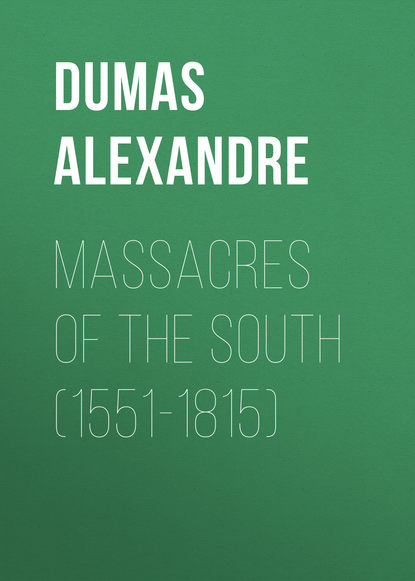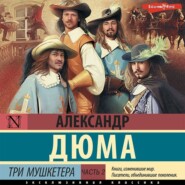По всем вопросам обращайтесь на: info@litportal.ru
(©) 2003-2024.
✖
Massacres of the South (1551-1815)
Настройки чтения
Размер шрифта
Высота строк
Поля
Catinat reported Lalande’s answer to his chief it was of a kind that he understood and liked, so leaving the rest of his troops at Massanes, he chose sixty men from his infantry, and eight horsemen as escort. On coming in sight of the bridge, he saw Lalande approaching from the other side. He at once ordered his sixty men to halt, went a few steps farther with his eight horsemen, and then ordered them in their turn to stop, and advanced alone towards the bridge. Lalande had acted in the same manner with regard to his dragoons and officers, and now dismounting, came towards Cavalier.
The two met in the middle of the bridge, and saluted with the courtesy of men who had learned to esteem each other on the field of battle. Then after a short silence, during which they examined each other, Lalande spoke.
“Sir,” said he, “the king in his clemency desires to put an end to the war which is going on between his subjects, and which can only result in the ruin of his kingdom. As he knows that this war has been instigated and supported by the enemies of France, he hopes to meet no opposition to his wishes among those of his subjects who were momentarily led astray, but to whom he now offers pardon.”
“Sir,” answered Cavalier, “the war not having been begun by the Protestants, they are always ready for peace – but a real peace, without restriction or reserve. They have no right, I know, to lay down conditions, but I hope they will be permitted to discuss those which may be laid down for them. Speak openly, sir, and let me know what the offers are that you have been authorised to make to us, that I may judge if we can accept them.”
“But how would it be,” said Lalande, “if you were mistaken, and if the king desired to know what conditions you would consider reasonable?”
“If that is so,” answered Cavalier, “I will tell you our conditions at once, in order not to prolong the negotiations; for every minute’s delay, as you know, costs someone his life or fortune.”
“Then tell me what your conditions are,” returned Lalande.
“Well,” said Cavalier, “our demands are three first, liberty of conscience; secondly, the release of all prisoners who have been condemned to imprisonment or the galleys because of their religion; and thirdly, that if we are not granted liberty of conscience we may be at least permitted to leave the kingdom.”
“As far as I can judge,” replied Lalande, “I do not believe that the king will accept the first proposition, but it is possible that he may accede to the third. In that case, how many Protestants would you take with you?”
“Ten thousand of all ages and both sexes.”
“The number is excessive, sir. I believe that His Majesty is not disposed to go beyond three thousand.”
“Then,” replied Cavalier, “there is nothing more to be said, for I could not accept passports for any smaller number, and I could accept for the ten thousand only on condition that the king would grant us three months in which to dispose of our possessions and withdraw from the country without being molested. Should His Majesty, however, not be pleased to allow us to leave the kingdom, then we beg that our edicts be re-enacted and our privileges restored, whereupon we shall become once more, what we were formerly, His Majesty’s loyal and obedient servants.”
“Sir,” said Lalande, “I shall lay your conditions before M. le Marechal, and if no satisfactory conclusion can be arrived at, it will be to me a matter of profound regret. And now, sir, will you permit me to inspect more closely the gallant men with whose help you have done such astounding deeds?” Cavalier smiled; for these “gallant men” when caught had been broken on the wheel, burnt at the stake, or hanged like brigands. His sole answer was an inclination of the head as he turned and led the way to his little escort. M. de Lalande followed him with perfect confidence, and, passing by the eight horsemen who were grouped on the road, he walked up to the infantry, and taking out of his pocket a handful of gold, he scattered it before them, saying:
“There, my men! that is to drink the king’s health with.”
Not a man stooped to pick the money up, and one of them said, shaking his head,
“It is not money we want, but liberty of conscience.”
“My men,” answered Lalande, “it is unfortunately not in my power to grant your demand, but I advise you to submit to the king’s will and trust in his clemency.”
“Sir,” answered Cavalier, “we are all ready to obey him, provided that he graciously grant us our just demands; if not, we shall die weapon in hand, rather than expose ourselves once more to such outrages as have already been inflicted on us.”
“Your demands shall be transmitted word for word to M. de Villars, who will lay them before the king,” said Lalande, “and you may be sure, sir, that my most sincere wish is that His Majesty may not find them exorbitant.”
With these words, M. de Lalande saluted Cavalier, and turned to rejoin his escort; but Cavalier, wishing to return confidence with confidence, crossed the bridge with him, and accompanied the general to where his soldiers had halted. There, with another salute, the two chiefs parted, M. de Lalande taking the road to Uzes, while Cavalier rejoined his comrades.
Meantime d’Aygaliers, who, as we have seen, had not left Uzes until the 5th May, in order to join Cavalier, did not come up with him until the 13th, that is to say, the day after his conference with Lalande. D’Aygaliers gives us an account of their interview, and we cannot do better than quote it.
“Although it was the first time that we had met face to face, we embraced each other as if we were old acquaintances. My little band mixed with his and sang psalms together, while Cavalier and I talked. I was very much pleased with what, he said, and convinced him without difficulty that he should submit for the sake of the brethren, who could then choose whichever course best suited them, and either leave the kingdom or serve the king. I said that I believed the last course to be the best, provided we were allowed to worship God according to our consciences; because I hoped that, seeing their faithful service, His Majesty would recognise that he had been imposed upon by those who had described us as disloyal subjects, and that we should thus obtain for the whole nation that liberty of conscience which had been granted to us; that in no other way, as far as I could see, could our deplorable condition be ameliorated, for although Cavalier and his men might be able to exist for some time longer in the forests and mountains, they would never be strong enough to save the inhabitants of towns and other enclosed places from perishing.
“Upon this he replied, that although the Catholics seldom kept a promise made to those of our religion, he was willing to risk his life for the welfare of his brethren and the province but that he trusted if he confided in the clemency of the king for whom he had never ceased to pray, no harm would happen him.”
Thereupon d’Aygaliers, delighted to find him so well inclined, begged him to give him a letter for M. de Villars, and as Cavalier knew the marechal to be loyal and zealous, and had great confidence in him, he wrote without any hesitation the following letter:
“MONSEIGNEUR, – Permit me to address your Excellency in order to beg humbly for the favour of your protection for myself and for my soldiers. We are filled with the most ardent desire to repair the fault which we have committed by bearing arms, not against the king, as our enemies have so falsely asserted, but to defend our lives against those who persecuted us, attacking us so fiercely that we believed it was done by order of His Majesty. We know that it was written by St. Paul that subjects ought to submit themselves to their king, and if in spite of these sincere protestations our sovereign should still demand our blood, we shall soon be ready to throw ourselves on his justice or his mercy; but we should, Monseigneur, regard ourselves as happy, if His Majesty, moved by our repentance, would grant us his pardon and receive us into his service, according to the example of the God of mercy whose representative His Majesty is on earth. We trust, Monseigneur, by our faithfulness and zeal to acquire the honour of your protection, and we glory in the thought of being permitted, under the command of such an illustrious and noble-minded general as yourself, to shed our blood for the king; this being so, I hope that your Excellency will be pleased to allow me to inscribe myself with profound respect and humility, Monseigneur, your most humble and obedient servant, “CAVALIER.”
D’Aygaliers, as soon as he got possession of this letter, set out for Nimes in the best of spirits; for he felt sure that he was bringing M. de Villars more than he had expected. And, indeed, as soon as the marechal saw how far things had gone, in spite of everything that Lalande could say, who in his jealousy asserted that d’Aygaliers would spoil everything, he sent him back to Cavalier with an invitation to come to Nimes. D’Aygaliers set out at once, promising to bring the young chief back with him, at which Lalande laughed loudly, pretending to be very much amused at the baron’s confident way of speaking, and protesting that Cavalier would not come.
In the meantime events were happening in the mountains which might easily have changed the state of mind of the young chief. The Comte de Tournan, who was in command at Florae, had encountered Roland’s army in the plain of Fondmortes, and had lost two hundred men, a considerable sum of money, and eighty mules loaded with provisions. The anxiety which this news caused to M. de Villars was soon relieved; for six days after the defeat he received a letter from Cavalier by the hands of Lacombe, the same who had brought about the interview on the bridge of Avenes. In this letter Cavalier expressed the greatest regret for what had just happened.
D’Aygaliers therefore found Cavalier in the best of humours when he joined him at Tarnac. The first feeling that the young chief felt on receiving the invitation was one of stupefaction; for an interview with the marechal was an honour so unexpected and so great, that his impression was that some treason lay behind it; but he was soon reassured when he recalled the character for loyalty which the marechal bore, and how impossible it was that d’Aygaliers should lend himself to treachery. So Cavalier sent back word that he would obey the marechal’s orders; and that he put himself entirely into his hands in what concerned the arrangements for the interview. M. de Villars let him know that he would expect him on the 16th in the garden of the convent of the Recollets of Nimes, which lay just outside the city, between the gates of Beaucaire and the Madeleine, and that Lalande would meet him beyond Carayrac to receive him and to bring him hostages.
CHAPTER IV
On the 15th May Cavalier set out from Tarnac at the head of one hundred and sixty foot-soldiers and fifty horse; he was accompanied by his young brother and by d’Aygaliers and Lacombe. They all passed the night at Langlade.
The next day they set out for Nimes, and, as had been agreed upon, were met by Lalande between Saint-Cesaire and Carayrac. Lalande advanced to greet Cavalier and present the hostages to him. These hostages were M. de La Duretiere, captain of the Fimarcon regiment, a captain of infantry, several other officers, and ten dragoons. Cavalier passed them over to his lieutenant, Ravanel, who was in command of the infantry, and left them in his charge at Saint-Cesaire. The cavalry accompanied him to within a musket-shot of Nimes, and encamped upon the heights. Besides this, Cavalier posted sentinels and mounted orderlies at all the approaches to the camp, and even as far off as the fountain of Diana and the tennis-court. These precautions taken, he entered the city, accompanied by his brother, d’Aygaliers, Lacombe, and a body-guard of eighteen cavalry, commanded by Catinat. Lalande rode on before to announce their arrival to the marechal, whom he found waiting with MM. de Baville and Sandricourt, in the garden of the Recollets, dreading every moment to receive word that Cavalier had refused to come; for he expected great results from this interview. Lalande, however, reassured him by telling him the young Huguenot was behind.
In a few minutes a great tumult was heard: it was the people hastening to welcome their hero. Not a Protestant, except paralytic old people and infants in the cradle, remained indoors; for the Huguenots, who had long looked on Cavalier as their champion, now considered him their saviour, so that men and women threw themselves under the feet of his horse in their efforts to kiss the skirts of his coat. It was more like a victor making his entry into a conquered town than a rebel chief coming to beg for an amnesty for himself and his adherents. M. de Villars heard the outcry from the garden of Recollets, and when he learned its cause his esteem for Cavalier rose higher, for every day since his arrival as governor had showed him more and more clearly how great was the young chief’s influence. The tumult increased as Cavalier came nearer, and it flashed through the marechal’s mind that instead of giving hostages he should have claimed them. At this moment Cavalier appeared at the gate, and seeing the marechal’s guard drawn up in line, he caused his own to form a line opposite them. The memoirs of the time tell us that he was dressed in a coffee-coloured coat, with a very full white muslin cravat; he wore a cross-belt from which depended his sword, and on his head a gold-laced hat of black felt. He was mounted on a magnificent bay horse, the same which he had taken from M. de La Jonquiere on the bloody day of Vergenne.
The lieutenant of the guard met him at the gate. Cavalier quickly dismounted, and throwing the bridle of his horse to one of his men, he entered the garden, and advanced towards the expectant group, which was composed, as we have said, of Villars, Baville, and Sandricourt. As he drew near, M. de Villars regarded him with growing astonishment; for he could not believe that in the young man, or rather boy, before him he saw the terrible Cevenol chief, whose name alone made the bravest soldiers tremble. Cavalier at this period had just completed his twenty-fourth year, but, thanks to his fair hair which fell in long locks over his shoulders, and to the gentle expression of his eyes he did not appear more than eighteen. Cavalier was acquainted with none of the men in whose presence he stood, but he noticed M. de Villars’ rich dress and air of command. He therefore saluted him first; afterwards, turning towards the others, he bowed to each, but less profoundly, then somewhat embarrassed and with downcast eyes he stood motionless and silent. The marechal still continued to look at him in silent astonishment, turning from time to time to Baville and Sandricourt, as if to assure himself that there was no mistake and that it was really the man whom they expected who stood before them. At last, doubting still, in spite of the signs they made to reassure him, he asked —
“Are you really Jean Cavalier?”
“Yes, monseigneur,” was the reply, given in an unsteady voice.
“But I mean Jean Cavalier, the Camisard general, he who has assumed the title of Duke of the Cevennes.”
“I have not assumed that title, monseigneur, only some people call me so in joke: the king alone has the right to confer titles, and I rejoice exceedingly, monseigneur, that he has given you that of governor of Languedoc.”
“When you are speaking of the king, why do you not say ‘His Majesty’?” said M. de Baville. “Upon my soul, the king is too good to treat thus with a rebel.”
The blood rushed to Cavalier’s head, his face flamed, and after a moment’s pause, fixing his eye boldly upon M. de Baville, and speaking in a voice which was now as firm as it had been tremulous a moment before, he said, “If you have only brought me here, sir, to speak to me in such a manner, you might better have left me in my mountains, and come there yourself to take a lesson in hospitality. If I am a rebel, it is not I who am answerable, for it was the tyranny and cruelty of M. de Baville which forced us to have recourse to arms; and if history takes exception to anything connected with the great monarch for whose pardon I sue to-day, it will be, I hope, not that he had foes like me, but friends like him.”
M de Baville grew pale with anger; for whether Cavalier knew to whom he was speaking or not, his words had the effect of a violent blow full in his face; but before he could reply M. de Villars interposed.
“Your business is only with me, sir,” he said; “attend to me alone, I beg: I speak in the name of the king; and the king, of his clemency, wishes to spare his subjects by treating them with tenderness.”
Cavalier opened his mouth to reply, but the intendant cut him short.
“I should hope that that suffices,” he said contemptuously: “as pardon is more than you could have hoped for, I suppose you are not going to insist on the other conditions you laid down?”
“But it is precisely those other conditions,” said Cavalier, addressing himself to M. de Villars, and not seeming to see that anyone else was present, “for which we have fought. If I were alone, sir, I should give myself up, bound hand and foot, with entire confidence in your good faith, demanding no assurances and exacting no conditions; but I stand here to defend the interests of my brethren and friends who trust me; and what is more, things have gone so far that we must either die weapon in hand, or obtain our rights.”
The intendant was about to speak, but the marechal stopped him with such an imperative gesture that he stepped back as if to show that he washed his hands of the whole matter.
“What are those rights? Are they those which M. Lalande has transmitted to me by word of mouth?”
“Yes, sir.”
“It would be well to commit them to writing.”
“I have done so, monseigneur, and sent a copy to M. d’Aygaliers.”
“I have not seen it, sir; make me another copy and place it in my hands, I beg.”

















